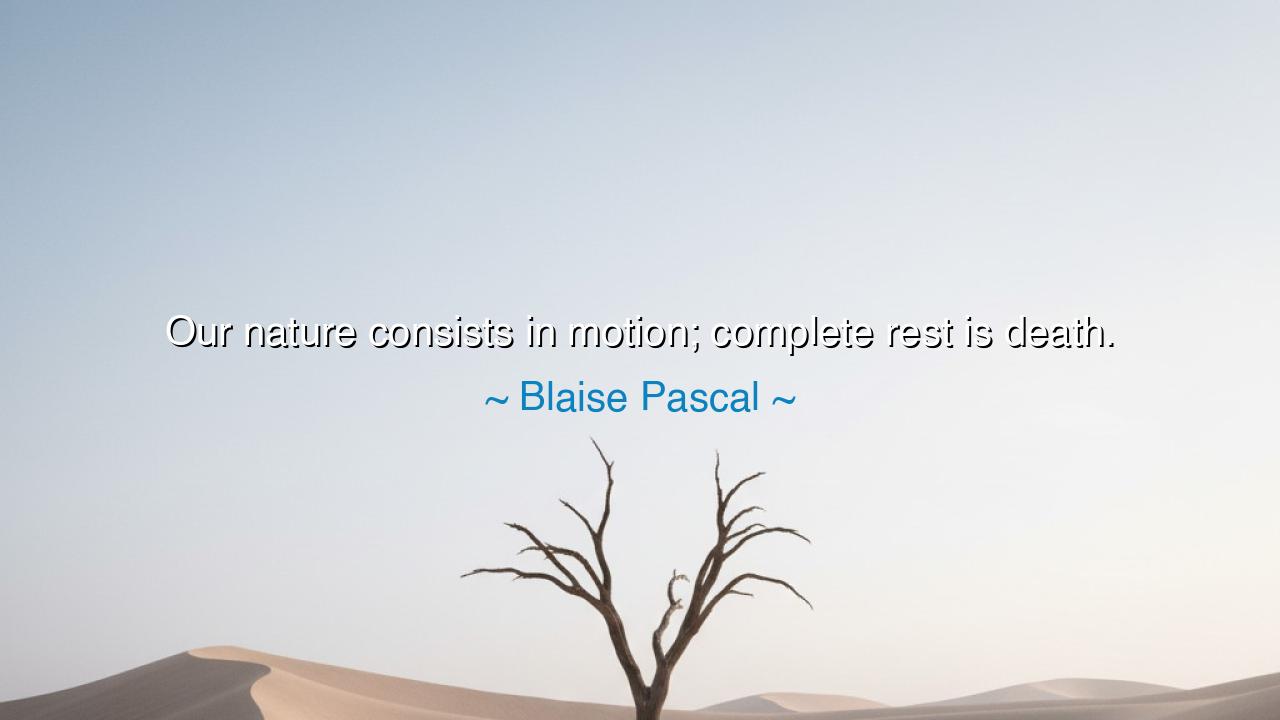
Our nature consists in motion; complete rest is death.






Blaise Pascal, that luminous mind of both science and spirit, once wrote: “Our nature consists in motion; complete rest is death.” These words, though few, contain the pulse of the universe itself. They remind us that life is not stillness but movement — not quiet repose, but ceaseless change, struggle, and striving. From the beating of the heart to the turning of the stars, all that lives moves, and all that ceases to move decays. Pascal, both mathematician and philosopher, knew that the human soul was no exception: when it stops seeking, questioning, and aspiring, it begins to die long before the body does.
In these words, Pascal speaks not only of physical motion but of the motion of the spirit. He saw that man is born restless — ever yearning, ever chasing some horizon beyond his reach. The mind hungers for knowledge; the heart hungers for meaning. It is this sacred restlessness, this inner fire, that propels us forward through the storms of life. To be alive is to strive; to stop striving is to sink into the gray stillness of despair. Thus, Pascal’s truth is both natural and moral: movement is the essence of being, while stagnation is the shadow of death.
The ancients, too, understood this. Heraclitus, the Greek philosopher of flux, declared that all things flow — that nothing in this world remains the same, not even for an instant. The rivers change, and so do we. To cling to stillness, to resist motion, is to deny the very law of life. The oak grows by breaking through the seed; the bird learns to fly by leaving the nest; the human soul matures by enduring struggle. Even the heavens, which seem eternal and unmoving, are in perpetual motion — the stars dance through infinite space, and the cosmos breathes in endless rhythm. To move is to live, for all creation is a grand, divine motion.
History offers us countless examples of this truth. Consider the story of Leonardo da Vinci, whose mind never rested. He was painter, inventor, anatomist, philosopher — a man who embodied Pascal’s creed that life consists in motion. Had he sought comfort, had he been content with what he knew, his genius would have withered. But his eternal curiosity kept him alive in spirit, centuries beyond his mortal years. His notebooks, filled with sketches of flight and anatomy, reveal a soul unwilling to be still — a man who lived as if stillness were indeed a kind of death. Leonardo’s life teaches that to move — in thought, in art, in creation — is to remain forever alive.
Yet Pascal’s wisdom also bears a warning. Many, in seeking rest, mistake idleness for peace. But peace is not the absence of motion — it is motion in harmony. The ocean is never still, yet it is tranquil in its rhythm. So too must we find balance between striving and stillness, between progress and reflection. Complete rest, Pascal warns, is not peace but the silence of the grave. To withdraw entirely from effort, from thought, from growth, is to die before one’s time. The wise soul learns not to escape motion, but to move with purpose — to let motion refine, not consume, the spirit.
This teaching is deeply human. We are creatures of progress, made to journey rather than to dwell. Every challenge, every dream, every change is a call to motion. Even in sorrow, we move — through grief toward healing, through confusion toward understanding. To live is to keep walking, even when the road is hard and the horizon far. For when we cease to walk — when we surrender to apathy — our inner flame flickers, and the death Pascal spoke of begins within. Stagnation is the soul’s decay.
So take this wisdom into your heart: Never let your spirit stand still. Move your body, yes — but more importantly, move your mind, your heart, your purpose. Learn something new, dare something difficult, love more deeply, forgive more swiftly. Seek not comfort, but growth. The universe itself is in motion — and you are part of its divine current. If you move with it, you will live fully; if you resist it, you will fade away.
For truly, Pascal spoke the law of all existence: “Our nature consists in motion; complete rest is death.” Let these words guide you like a compass — forward, onward, upward. Keep the fire of movement alive within you, for in every step, every breath, every act of will, you honor the life that stirs within and the Creator who set it in motion. Move bravely, and you shall never truly die.






AAdministratorAdministrator
Welcome, honored guests. Please leave a comment, we will respond soon